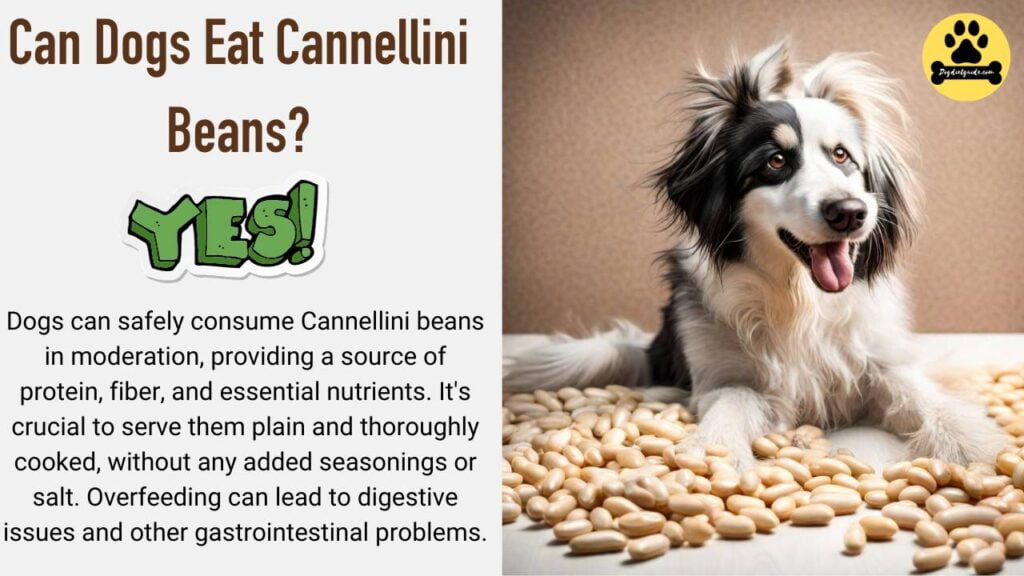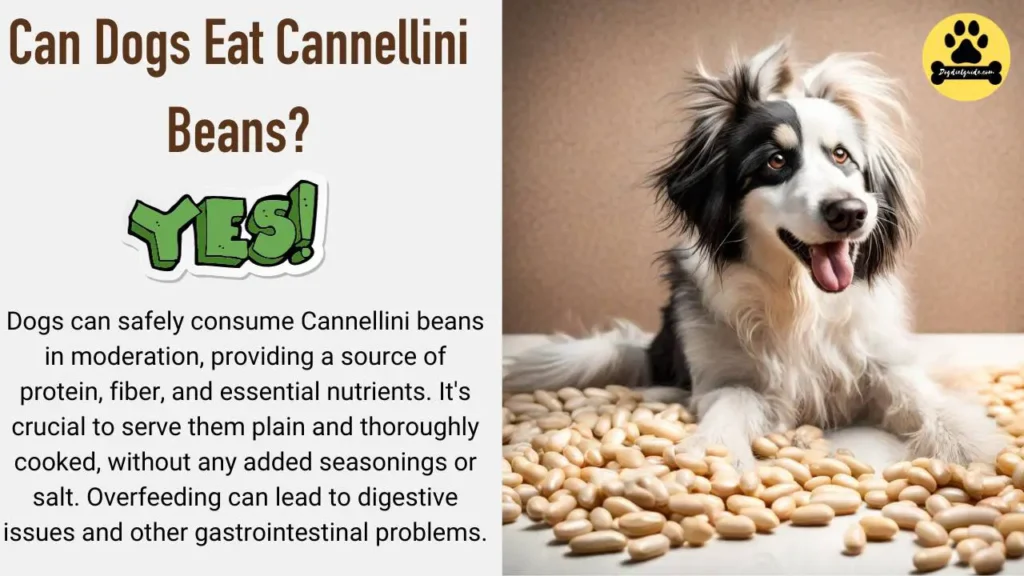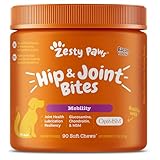When it comes to our furry friends, we want to ensure they’re receiving the best nutrition possible. This often leads to questions about what human foods are safe for dogs to consume. One such food in question is cannellini beans commonly known as white kidney beans. So, can dogs eat cannellini beans?
Can Dogs Eat Cannellini Beans?
Yes, dogs can safely consume Cannellini beans in moderation, providing a source of protein, fiber, and essential nutrients. It’s crucial to serve them plain and thoroughly cooked, without any added seasonings or salt. Overfeeding can lead to digestive issues and other gastrointestinal problems.
What Are Cannellini Beans?
Cannellini beans, also known as white kidney beans, are a type of legume native to Italy. They are creamy white and have a mild, nutty flavor.
These beans are a rich source of protein, fiber, and essential nutrients, making them a popular choice in many human diets.
Nutritional Value
Before considering whether dogs can eat white kidney beans, it’s essential to understand their nutritional profile.
Cannellini beans are packed with nutrients such as protein, fiber, iron, and folate. They also contain essential minerals like magnesium, potassium, and phosphorus.
Essential Considerations
Like most legumes, Cannellini beans are not toxic to dogs in small quantities. They can be a protein, fiber, and certain vitamins and minerals source. However, it’s important to keep a few things in mind:
-
Moderation: If you want to feed your dog cannellini beans, do so in moderation. They should not make up a significant portion of your dog’s diet.
-
Cooked and Plain: If you feed your dog cannellini beans, ensure they are thoroughly cooked and plain. Avoid adding seasoning, salt, or other additives, as these can harm canines.
-
Potential Digestive Issues: Legumes like cannellini beans for dogs can sometimes be difficult for puppies to digest, especially if they’re not used to them. Start with a small amount and monitor your dog for signs of digestive upset like gas, diarrhea, or vomiting.
-
Consider the Dog’s Individual Needs: Some puppies have dietary restrictions or specific health concerns that might make consuming beans less suitable. Always consult your veterinarian if you’re unsure.
-
Allergies or Sensitivities: Dogs can have allergies or sensitivities to certain foods like humans. Watch for any signs of an allergic reaction, such as itching, swelling, or difficulty breathing, and seek immediate veterinary attention if you observe any of these signs.
-
Avoid Canned Beans: Canned beans can contain high sodium, which is not good for canines. If you’re feeding beans to your furry friend, it’s best to use dried beans that have been thoroughly cooked and don’t contain any added seasonings or salt.
-
Balanced Diet: Remember that dogs have specific dietary needs, and while occasional beans can be a nice addition, they should not replace a balanced dog food.
Related Post: Can Dogs Eat Durian?
Benefits of Cannellini Beans for Dogs
-
Protein Source: Provides essential amino acids for muscle development.
-
Fiber Content: Supports digestive health and prevents constipation.
-
Complex Carbohydrates: Offers sustained energy levels.
-
Low in Fat: Suitable for weight management and certain health conditions.
-
Rich in Vitamins and Minerals: Contains nutrients like folate, potassium, magnesium, and iron.
-
Antioxidant Properties: Helps protect cells from damage.
-
Blood Sugar Regulation: Fiber aids in stabilizing blood sugar levels.
-
Weight Management: Promotes a feeling of fullness, aiding in weight control.
-
Digestive Health: Supports a healthy gut environment and beneficial gut bacteria.
-
Cholesterol Reduction: Soluble fiber can help lower cholesterol levels.
Risks and Considerations
Despite the potential benefits, there are also risks associated with feeding cannellini beans to canines. These beans contain lectins, which can harm dogs in large quantities.
Moreover, they are also known to cause gas and digestive discomfort in some dogs.
Cannellini Beans Side Effects In Dogs
-
Flatulence and Digestive Discomfort: Beans may cause gas and discomfort, especially if not part of the regular diet.
-
Upset Stomach: Overconsumption or improper preparation can lead to vomiting or diarrhea.
-
Anti-Nutrients: Compounds like lectins and phytic acid may affect nutrient absorption if beans are not cooked adequately.
-
Allergies or Sensitivities: Some dogs may have allergic reactions or sensitivities to beans.
-
Weight Gain: Excessive bean consumption can contribute to weight gain.
-
Kidney Issues: Beans are relatively high in purines, which may be a concern for dogs with kidney or urinary tract problems.
-
Pancreatitis Risk: High-fat bean dishes can potentially trigger pancreatitis in dogs.
-
Sodium Content: Canned beans may contain added sodium, which can be harmful in excess.
How to Include Cannellini Beans in Your Dog’s Diet Safely.
If you decide to introduce white kidney beans to your dog’s diet, it’s crucial to do so safely and carefully. This includes cooking the beans thoroughly to eliminate lectins and avoiding seasonings or additives that may harm puppies.
Regardless of the potential benefits, it’s important to emphasize that cannellini beans should only be an occasional dog treat. They should keep the primary sources of nutrition in a dog’s diet, such as high-quality dog food.
Signs of Allergic Reactions or Digestive Issues
When introducing any new food to your dog’s diet, monitoring them for any signs of allergic reactions or digestive issues is essential. These may include vomiting, diarrhea, or changes in behavior.
Can Dogs Eat Cannellini Beans? Recommendations from Veterinarians
Veterinarians recommend introducing new foods gradually and in small quantities to monitor your dog’s reaction. While some dogs may tolerate cannellini beans well, others may experience adverse effects. Observing your dog for any signs of digestive distress or allergic reactions after consuming beans is crucial.
In general, veterinarians advise against feeding dogs large amounts of beans, including cannellini beans, due to the risk of gastrointestinal upset and potential toxicity from lectins.
Related Post: Is Vanilla Bean Safe for Dogs?

FAQs
Are Cannellini Beans Safe for Dogs to Eat Raw?
No, raw cannellini beans are not safe for dogs to consume. They contain lectins and other compounds that can be toxic to dogs. Always cook beans thoroughly before feeding them to your dog.
Can Cannellini Beans Cause Allergic Reactions in Dogs?
Yes, some dogs may be allergic to cannellini beans or develop sensitivities over time. Monitor your dog for signs of allergic reactions, such as itching, swelling, or gastrointestinal symptoms, and consult your veterinarian if you have concerns.
How Should Cannellini Beans Be Prepared for Dogs?
Cannellini beans should be cooked thoroughly before being fed to dogs. Avoid adding seasonings, spices, or additives, as these can harm your pet. Plain, boiled cannellini beans are the safest option for dogs.
What Are the Signs of Bean Poisoning in Dogs?
Signs of bean poisoning in dogs may include vomiting, diarrhea, abdominal pain, lethargy, and loss of appetite. If you suspect your dog has ingested toxic beans, contact your veterinarian immediately for guidance.
Can Dogs Benefit from Eating Cannellini Beans?
In moderation, cannellini beans can provide dogs with essential nutrients such as protein, fiber, and vitamins. However, it’s essential to balance their diet with other nutritious foods and consult a veterinarian before making significant dietary changes.
How Often Can Dogs Eat Cannellini Beans?
Cannellini beans should only be offered to dogs occasionally and in small quantities. Incorporate them as an occasional treat or mix them with other dog-friendly ingredients as part of a balanced meal plan.
Final Thoughts: Can Dogs Eat Cannellini Beans?
In conclusion, while cannellini beans can offer some nutritional benefits for dogs, they should be cautiously approached. Always prioritize your dog’s safety and consult a veterinarian before making any significant changes to their diet.
Remember, moderation is essential, and balanced, high-quality dog food should always be your furry friend’s primary source of nutrition.
Resources:
https://www.petmd.com/dog/nutrition/can-dogs-eat-beans
https://www.masterclass.com/articles/can-dogs-eat-kidney-beans










![Can Dogs Eat Blood? 7 Side Effects [Expert Opinion]](https://petskor.com/wp-content/uploads/2022/04/Webp.net-resizeimage-12.jpg)
